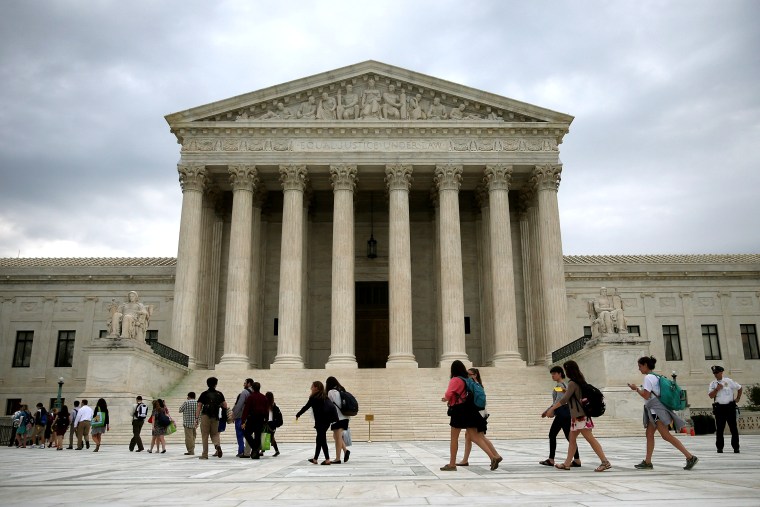With four major voting rights cases currently before the courts, access to the ballot for the upcoming midterms hangs in the balance. But the stakes could be much higher still.
If one of the cases winds up before the Supreme Court, as looks likely, it could give Chief Justice John Roberts and his conservative colleagues a chance to decisively weaken safeguards against race bias in voting. And with the Republican-controlled Congress unlikely to pass new voting protections, that could usher in a bleak new era for voting in America — half a century after the issue looked to have been put to rest.
"I’m very worried that the Supreme Court will take a case on the merits, and write an opinion that drastically constricts the right to vote," said Daniel Tokaji, an election law scholar at Ohio State University. "I think that is a very real danger, given the conservative composition of this court, which has shown itself to be no friend to voting rights."
Justice Ruth Bader Ginsburg this week named the Shelby County v. Holder ruling, which neutered the Voting Rights Act’s strongest provision, as one of the current court's three worst. But Shelby left open a key question: What kinds of voting restrictions is the post- version of the VRA strong enough to stop? Any of the four pending cases could give the court a chance to provide an answer.
"I’m very worried that the Supreme Court will take a case on the merits, and write an opinion that drastically constricts the right to vote."'
In a brief order issued Monday, the court’s five conservative justices said Ohio’s cuts to early voting and elimination of same-day registration can go into effect, after previously being blocked by a federal judge. But a full trial on the cuts won’t happen until next year. Meanwhile, Wisconsin’s voter ID law, struck down by a federal judge as racially discriminatory under the VRA, is now back on, thanks to an appeals court ruling. Parts of North Carolina’s restrictive voting law were blocked Wednesday by a federal appeals court, while others were allowed to go forward. And a district court ruling is expected soon on Texas’s strict ID law.
At issue in all four cases: How burdensome do voting restrictions have to be, and for how many voters, before they run afoul of the courts? An estimated 1.2 million Texans who are eligible to vote don’t have an ID, and some would have to travel more than 250 miles round-trip to get one. Some Wisconsin voters have already returned their absentee ballots, and would now have to return with an ID to make them count. If the justices uphold either law, it’ll send a message that those looking to make voting harder have little to fear from the courts.
“If the Supreme Court gives the green light to all the voting cutbacks, and especially if it does so reading the Constitution and the Voting Rights Act narrowly, then expect to see even more Republican legislatures pass voting cutbacks in time for the 2016 elections,” Rick Hasen, an election law scholar at the University of California, Irvine, wrote in Slate this week.
There’s also an even more far-reaching question at issue: Exactly how much evidence of racial discrimination must challengers show under the VRA's Section 2, now it's strongest plank?
That was the question left open by Shelby. “Section 2 is permanent, applies nationwide, and is not at issue in this case,” was all that Roberts said on the issue in his majority opinion. But for years, conservatives have been working to narrow the definition of discrimination under Section 2 so that it applies only to laws enacted with evidence of deliberate racial bias. Since few lawmakers these days publicize an intention to racially discriminate, Section 2 would be all but useless under that interpretation.
Voting rights advocates want a broader scope for Section 2. It should apply to any law that disproportionately impacts minorities, they argue, if the law can be shown to interact with other factors, such as a history of socio-economic discrimination.
That’s the current understanding of Section 2, and it’s the standard that District Court Judge Lynn Adelman applied when he struck down Wisconsin’s voter ID law. In a ruling that voting rights advocates held up as a model, Adelman found that minorities were more likely than whites to lack ID because a history of discrimination had left them more likely to be poor and uneducated.
One major question is: Which of those four cases the justices end up weighing in on could be crucial? Some observers, including Hasen, see Ohio’s early voting cuts as far less burdensome than the other laws, meaning that, if it came before the court, it might result in a ruling that sets back voting rights. Texas’s law, by contrast, already blocked under Section 5 of the VRA when it was still in effect, might be a harder call, even for some members of the conservative majority.
Of course, whichever case the court takes, it could rule narrowly, avoiding any sweeping interpretations of the VRA's power. But there are reasons to think the justices will go rule more broadly. For one thing, there's genuine disagreement among lower courts about how to interpret Section 2 — as a comparison of Adelman's ruling with the far narrower view offered by District Court Judge Thomas Schroeder in the North Carolina case makes clear.
Perhaps more ominously, since his days as a young lawyer in the Reagan Justice Department, Roberts has appeared intent on narrowing the scope of the VRA — part of a bigger quest to push back against what he sees as over-broad efforts to stop racial discrimination.
He could soon get his chance.
